|
|
| BENJAMIN WEST (1738-1820) |
American expatriate painter
Authors, Artist & Poets
He lived in London from 1763 until his death in 1820. He succeeded his good friend Sir Joshua Reynolds as President of the Royal Academy. He was noted for his paintings "Death of Wolfe," "Penn's Treaty with the Indians," and numerous royal portraits. Manuscript letter written and signed by West to United States Minister Rufus King, dated August 7, 1802. West was planning an excursion to Paris with his youngest son to view the French National Gallery of Art, and wanted King to help with a letter of introduction to the American Minister at Paris, and with obtaining the necessary passports. West was taking advantage of the brief cessation of hostilities between France and Great Britain produced by the Treaty of Amiens and the following May the fragile peace collapsed, and war was renewed until Napoleon was driven from power more than a decade later! A great letter, with one of the greatest painters of his time arranging an artistic expedition to the art capital of Europe through a tiny window of opportunity in the otherwise turbulent era of the Napoleonic Wars. $2900.00
|
|
 |
|
|
| THORNTON WILDER (1840-1902) |
American playwright and novelist who received three Pulitzer Prizes
Authors, Artist & Poets
Thornton Wilder (1897-1975) was an American playwright and novelist who received three Pulitzer Prizes for his novel The Bridge of San Luis Rey and two of his plays, Our Town and The Skin of Our Teeth. This letter, dated December 13, 1963, is written entirely in Thornton Wilder's hand to Stanley Woodward of Rockport, Massachusetts. Wilder thanks Woodward for a previous letter and remarks that he wishes he could "see Rockport again and talk over all times." He talks about living in the Arizona desert for the past year and a half and mentions an upcoming trip he plans to take on January 4 to "continue my semi-hermit's life abroad." He wishes "A Happy Christmas Season" in bold pencil to Woodward and signs it "ever cordially, Thornton." A very personal note. $325.00
|
|
 |
|
|
| P.G.T. BEAUREGARD (1818-1893) |
First prominent general of the Confederate Army during the Civil War
Civil War
P.G.T. Beauregard was a Louisiana-born American military officer, politician, inventor, writer, civil servant and the first prominent general of the Confederate Army during the Civil War. While his commonly referred to as P.G.T. Beauregard, he rarely used his first name and signed all correspondence and official documents as G.T. Beauregard.
Brigadeer General Beauregard ordered the bombardment of Fort Sumter at 4:30 am on April 12, 1861, an action that signaled the beginning of the Civil War. The Union defenders under the leadership of Major Robert Anderson held out for almost 36 hours despite a relentless attack by Beauregard and his troops. After a bombardment that amounted to over 3,300 shells. Anderson finally called for a truce.
Beauregard next took command of the Army of the Potomac and would win the infamous Battle of Bull Run in July 1861. He would later take command of the Army of the Mississippi where he would remain until he was relieved of his duties due to ill health just prior to the Confederate withdrawal from Corinth to Tupelo, Mississippi.
This museum quality frame (27" x 19") houses two smaller frames. On the right, a portrait of General P.G.T. Beauregard in uniform. On the left, a check drawn on the Mutual National Bank of New Orleans, dated January 1, 1879 and made out to "bearer" for $150.00. The check, in excellent condition, is written entirely in Beauregard's hand and signed "G.T. Beauregard." $1100.00
|
|
 |
 BENJAMIN F. BUTLER (1818-1893)
|
| BENJAMIN F. BUTLER (1818-1893) |
Union general, Massachusetts politician
Civil War
Known to the South as "Beast Butler" for his harsh rule of occupied New Orleans. He played an active role in the impeachment of President Andrew Johnson. Handwritten letter concerning legal matters, discussing the merits of a particular case. Addressed to US Attorney Sidney DeKay in New York, and dated April 23, 1872. Signed "B.F. Butler." $190.00
|
|
 |
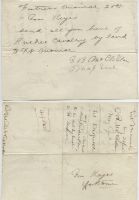 CIVIL WAR-PENINSULA CAMPAIGN
|
| CIVIL WAR-PENINSULA CAMPAIGN |
Civil War
Excellent and interesting telegraph dispatch sent by Major General George B. McClellan, commanding the Union forces during the Peninsula Campaign of 1862. This order was issued as the campaign had almost ended, in a humiliating Union defeat, as the aggressive Robert E. Lee emerged, and beat back the numerically superior but tactically timid McClellan. The order directs Major General Erasmus Keyes, who had earlier in the day been ordered to hold at Yorktown, to "send all you have of Rushes (sic) Cavalry by land to Ft. Monroe" at the base of the Peninsula. The cavalry in question was the 6th Regiment of Cavalry (70th PA Volunteers), the so-called "Rush's Lancers." Docketed on the reverse as a telegraph dispatch, with a content summary. A terrific, and very scarce, Civil War item. Wartime field orders of any sort are very hard to come by, as most were not retained. Not signed. $375.00
|
|
 |
|
|
| CONFEDERATE STATESMEN |
Clipped signatures on one piece of paper of two significant Confederate statesmen
Civil War
Signed first by JUDAH P. BENJAMIN (1811-1884), Highly capable cabinet officer know as the "Brains of the Confederacy." He served as Attorney General, Secretary of War, and finally Secretary of State, in which capacity he secured numerous foreign loans for the CSA, without succeeding in obtaining foreign recognition. Also signed by JOHN SLIDELL (1793-1871), Confederate Commissioner to Europe whose seizure, along with James M. Mason, from the British mail steamer "Trent" caused an international incident during the Civil War. He spent the war years trying to gain aid and recognition for the Confederacy in Paris. He never returned to the US after the Civil War. A great little souvenir of the Confederate government signed by two of its most prominent members. $325.00
|
|
 |
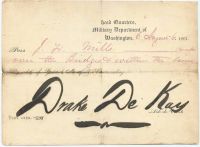 DRAKE DE KAY (1836-1886)
|
| DRAKE DE KAY (1836-1886) |
Union officer, breveted Lieutenant-Colonel for gallantry
Civil War
De Kay served on the staffs of Generals Mansfield, Pope, and Hooker during the Civil War. Partially printed pass from the Headquarters of the Military Department of Washington, dated August 6, 1861, just a few weeks after the First Battle of Bull Run, allowing passage "over the bridges & within the lines" of defense of Washington, DC. On the reverse is a printed loyalty oath that includes "and if ever hereafter found in arms against the Union, or in any way aiding her enemies, the penalty will be death." Signed on the front by De Kay as aide-de-camp with his famously enormous signature - the signature alone measures 1½" by 6"! De Kay's colossal autograph was well-remembered by many people moving within the capital boundaries during the early days of the war. "That fearful signature," one contemporary journalist wrote, " could be read as far away as the Sandwich Islands." Professionally de-acidified and backed. $265.00
|
|
 |
 ULYSSES S. GRANT (1822-1885)
|
| ULYSSES S. GRANT (1822-1885) |
General-in-Chief commanding the Union armies during the Civil War, 18th President of the United States
Civil War
Huge 17" by 21" printed membership certificate for The Society of the Army of the Potomac for Lt. V. Lansing Waters, formerly of the 4th New York Heavy Artillery during the Civil War. Signed by Grant as president of the Society. Archivally framed with a portrait of Grant, ready to hang. $2800.00
|
|
 |
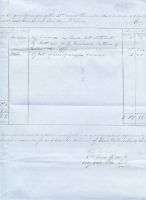 WILLIAM E. "GRUMBLE" JONES (1824-1864)
|
| WILLIAM E. "GRUMBLE" JONES (1824-1864) |
Confederate Cavalry General
Civil War
Confederate Cavalry General, succeeded J.E.B. Stuart as Colonel of the 1st Virginia Cavalry. A notoriously contentious, discipline-minded officer, he was killed in action in 1864. Great oversized accounting document concerning an amount due Jones from the United States in his capacity as Acting Assistant Commissary of Subsistence for the Regiment of Mounted Rifles stationed in Fort Merrill, Texas. Dated December 31, 1852, and signed "W. E. Jones." $195.00
|
|
 |
 WILLIAM E. "GRUMBLE" JONES (1824-1864)
|
| WILLIAM E. "GRUMBLE" JONES (1824-1864) |
Confederate Cavalry General
Civil War
WILLIAM E. "GRUMBLE" JONES (1824-1864) Confederate Cavalry General, succeeded J.E.B. Stuart as Colonel of the 1st Virginia Cavalry. A notoriously contentious, discipline-minded officer, he was killed in action in 1864. Check drawn on Farmers' and Mechanics' Bank of Philadelphia for $26.00, dated March 30, 1860. Signed "W. E. Jones." $295.00
|
|
 |
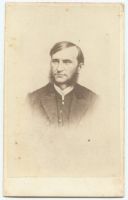 H. JUDSON KILPATRICK (1836-1881)
|
| H. JUDSON KILPATRICK (1836-1881) |
Union Cavalry General during the Civil War
Civil War
Union Cavalry General during the Civil War whose reckless style earned him the sobriquet "Kill-cavalry." A West Point graduate, he was the first officer of the regular Army to be wounded in the war. He served in the Gettysburg campaign and on Sherman's march to the sea. After the war, he served as US Minister to Chile. Nice crisp carte-de-visite (CDV) bust view of Kilpatrick. No backmark. Excellent condition. $135.00
|
|
 |
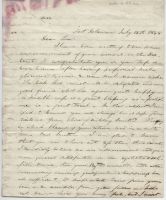 ROBERT E. LEE (1807-1870)
|
| ROBERT E. LEE (1807-1870) |
Confederate General, Superintendent of West Point
Civil War
A wonderful and fascinating letter to Lee from West Point classmate JACK MACKAY, a scion of one of Savannah's finest families, and one of Lee's closest friends a and confidantes. Dated July 18th, 1848, from Fort Delaware. Mackay is writing to welcome Lee on his "return home after having performed such glorious service & near such narrow risks," referring to the recent victory in the Mexican War. A particularly poignant line mentions "I do not know how you may feel, but I most sincerely hope that our country have no more wars in our day," little knowing that his friend was destined to lead the Confederate armies in the bloodiest war the country had ever seen. Terrific content covering world affairs, political commentary, engineering issues (both men were engineers by training, and had experience building and improving coastal forts). A docket indicates that the letter was not sent, as Lee had already arrived. Not signed. Transcription provided. $7500.00
|
|
 |
|
|
| ROBERT E. LEE (1807-1870) |
Confederate General, Superintendent of West Point
Civil War
Confederate General, Superintendent of West Point. Served spectacularly in the Mexican War, with the elite 2nd U.S. cavalry in Texas and at Harper's Ferry. General Winfield Scott called him "the best soldier I ever saw in the field." Symbol of the Southern cause. After the war he became the President of Washington College, now Washington and Lee University. A portrait photograph (2 1/2" x 3 1/2") of Lee, signed by him "R. E. Lee". (6 1/2" x 8 1/2"). $5900.00
|
|
 |
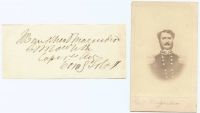 JOHN BANKHEAD MAGRUDER (1807-1871)
|
| JOHN BANKHEAD MAGRUDER (1807-1871) |
Confederate General whose sense of style and luxuriant taste earned him the nickname “Prince John.”
Civil War
Confederate General whose sense of style and luxuriant taste earned him the nickname "Prince John." After the Civil War, he led a small band of ex-Confederates into self-imposed exile in Mexico, not returning to the United States until 1867. Signature on paper, "J. Bankhead Magruder," with his pre-war rank of Captain in the 1st US Artillery. Also included is a carte-de-visite bust portrait of Magruder in what appears to be a militia major-general's uniform, by E. & H. T. Anthony of New York. $350.00
|
|
 |
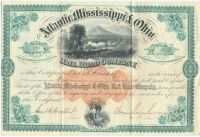 WILLIAM MAHONE (1826-1895)
|
| WILLIAM MAHONE (1826-1895) |
Confederate Major-General, famous for his defense at the Battle of the Crater in 1864
Civil War
Confederate Major-General, famous for his defense at the Battle of the Crater in 1864. Involved in Virginia railroads before and after the Civil War, he was politically active as a Republican in the post-war era. Beautiful, colorful engraved stock certificate of the Atlantic, Mississippi and Ohio Railroad Company. Signed "William Mahone" as president. $495.00
|
|
 |
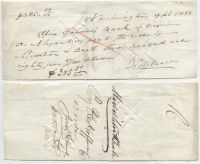 JAMES M. MASON (1798-1891)
|
| JAMES M. MASON (1798-1891) |
Senator from Virginia, Confederate emissary to Great Britain
Civil War
Senator from Virginia, Confederate emissary to Great Britain. His seizure from aboard the British mail steamer "Trent" by the Union Navy during the Civil War precipitated an international diplomatic incident, "The Trent Affair." Manuscript bank check written and signed by Mason, for $385.57. Dated February 14, 1860. Cut cancellation touches signature, but without any paper loss. $185.00
|
|
 |
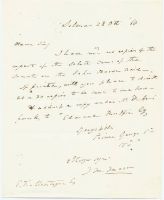 JAMES M. MASON (1798-1891)
|
| JAMES M. MASON (1798-1891) |
Senator from Virginia, Confederate emissary to Great Britain
Civil War
Senator from Virginia, Confederate emissary to Great Britain. His seizure from aboard the British mail steamer "Trent" by the Union Navy during the Civil War precipitated an international diplomatic incident, "The Trent Affair." Letter in Mason's hand to E. T. Montague asking for a copy of the report of the Senate Select Committee on the John Brown Raid of 1859, which frightened the South and galvanized Southern resistance to Northern interference with the institution of slavery. Dated October 28, 1860, just days before the election that elevated Lincoln to the presidency and sparked the Civil War. Signed "J. M. Mason." Mason was a strong Southern-rights Congressman, and probably wanted the report for its propaganda value, especially as he asks Montague to send "20 or 30 copies" if the report has been printed. Significantly, Mason directs that a copy be sent to Edmund Ruffin of Virginia, one of the arch-firebrands of the secessionist movement, who had been present at Brown's hanging and later claimed to have fired the first shot of the war at Fort Sumter. An interesting and important letter, offering a rare glimpse into the climactic machinations of the secessionist activists who gave birth to the Confederate States of America. $1550.00
|
|
 |
 JOHN TYLER MORGAN (1824-1907)
|
| JOHN TYLER MORGAN (1824-1907) |
Confederate Cavalry General during the Civil War
Civil War
Confederate Cavalry General during the Civil War. At the close of the war, he was involved with the Confederacy's last-ditch efforts to recruit and train black troops. Later served as US Senator. Manuscript letter on Senate stationery notifying the Senate Postmaster of his Summer address and requesting his mail be forwarded. Dated August 11, 1898, and signed "Jno Morgan." $225.00
|
|
 |
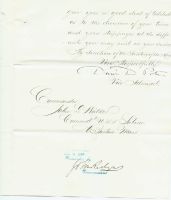 DAVID DIXON PORTER (1813-1891)
|
| DAVID DIXON PORTER (1813-1891) |
Union admiral and squadron commander
Civil War
Union admiral and squadron commander. The second US admiral, after David G. Farragut, he received Congressional commendations several times during the Civil War. Superintendent of the Naval Academy 1865-1869. Son of War of 1812 hero David Porter. Two-page document dated July 1, 1869, giving Commander John G. Walker of the USS Sabine his sailing orders, with provision for allowing his midshipmen to disembark to take their Naval Academy exams for promotion. Also signed by the Commandant of the Boston Navy Yard, JOHN RODGERS (1812-1882), scion of an illustrious American Navy family, Naval officer during the Civil War, senior US Navy Rear-admiral at the time of his death. $390.00
|
|
 |
|
|
| DAVID DIXON PORTER (1813-1891) |
Union admiral and squadron commander
Civil War
Union admiral and squadron commander. The second US admiral, after David G. Farragut, he received Congressional commendations several times during the Civil War. Superintendent of the Naval Academy 1865-1869. Son of War of 1812 hero David Porter. Brief note in Porter's own hand, marked "Private." The only date is "Sunday Evening." Cryptic content concerning a report that should be made, and signed "Yours in Haste, David D Porter." $225.00
|
|
 |
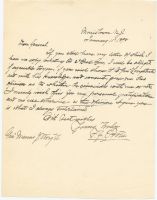 FITZ-JOHN PORTER (1822-1901)
|
| FITZ-JOHN PORTER (1822-1901) |
Distinguished veteran of the Mexican War, Union Major-General and corps commander
Civil War
Distinguished veteran of the Mexican War, Union Major-General and corps commander. He was the victim of one of the most grievous miscarriages of justice during the Civil War, when he was cashiered for his actions at the Second Battle of Bull Run. He was cleared of wrongdoing in 1878 and reinstated by special act of Congress in 1886. Interesting and significant letter written and signed by Porter, dated January 11, 1898, and addressed to former Confederate General Marcus J. Wright. In his letter, Porter asks Wright to show to former Confederate General James Longstreet Porter's earlier letter concerning the Second Battle of Bull Run. Wright was selected by the War Department in 1878 to supervise the gathering of Confederate records for publication in the Official Records of the Union and Confederate Armies. Porter was tried and cashiered for alleged failure to obey orders at Second Bull Run. He strove for years to clear his name, finally succeeding in having the sentence overturned by President Chester A. Arthur in 1882. A fascinating item. $795.00
|
|
 |
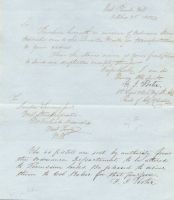 FITZ-JOHN PORTER (1822-1901)
|
| FITZ-JOHN PORTER (1822-1901) |
Distinguished veteran of the Mexican War, Union Major-General and corps commander
Civil War
Distinguished veteran of the Mexican War, Union Major-General and corps commander. He was the victim of one of the most grievous miscarriages of justice during the Civil War, when he was cashiered for his actions at the Second Battle of Bull Run. He was cleared of wrongdoing in 1878 and reinstated by special act of Congress in 1886. Manuscript ordnance invoice from West Point, dated October 26, 1850, and signed twice by Porter, since he has written out a postscript at the bottom and signed that as well. Two strong signatures and the early West Point association make this a particularly interesting document. $290.00
|
|
 |
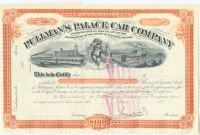 HORACE PORTER (1837-1921)
|
| HORACE PORTER (1837-1921) |
Union General, aide-de-camp to General US Grant during the Civil War
Civil War
Union General, aide-de-camp to General US Grant during the Civil War. Later US Ambassador to France. Awarded the Congressional Medal of Honor for his Civil War service, his memoir "Campaigning with Grant" is one of the best sources on the war's final battles. Beautifully engraved, unissued stock certificate of the Pullman Palace Car Company, signed "Horace Porter" as company president. $185.00
|
|
 |
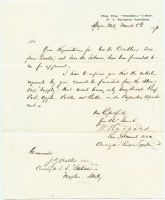 WILLIAM RADFORD (1808-1890)
|
| WILLIAM RADFORD (1808-1890) |
US Naval officer, veteran of the Mexican War, commanded “New Ironsides” in Civil War
Civil War
US Naval officer, veteran of the Mexican War, commanded "New Ironsides" in Civil War. Made a rear-admiral in 1866, he commanded the European Squadron 1869-1870. Manuscript letter on Flag Ship "Franklin" stationery, dated March 5, 1870, and addressed to Commander J.G. Walker of the "Sabine." The letter concerns supplies requested by Walker, and is signed "W. Radford," as rear-admiral commanding the European Squadron. $450.00
|
|
 |
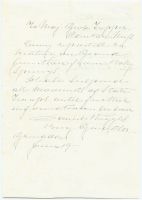 DANIEL RUGGLES (1810-1897)
|
| DANIEL RUGGLES (1810-1897) |
Confederate General, veteran of the Seminole War, graduate of West Point 1833
Civil War
Confederate General, veteran of the Seminole War, graduate of West Point 1833. He was twice brevetted for gallantry during the Mexican War. He commanded a division at Shiloh, and held various commands in the Mississippi theater. Brief letter written and signed by Ruggles, dated June 19, [1862], to Major-General Tupper, written at Grenada, Mississippi. Ruggles discusses the enemy retreat on Grand Junction, Tennessee, from Holly Springs, Mississippi. "Please suspend all movements of State Troops until further information." Signed "Our success, Daniel Ruggles, Brig. Genl. CSA." A clean and attractive item. $950.00
|
|
 |
|
|
| TENNESSEE UNION GUARDS |
Fascinating letter to future president, then Tennessee Governor, ANDREW JOHNSON (1808-1875), from a Tennessee Unionist company
Civil War
Fascinating letter to future president, then Tennessee Governor, ANDREW JOHNSON (1808-1875), from a Tennessee Unionist company. Manuscript petition addressed to Johnson, who was serving as military governor of occupied Tennessee. As governor, Johnson had command of the state's military forces, and it is in this capacity that the members of the Middle Tennessee Union Guards petitioned him for a new captain. Tennessee was a state of the Confederacy, and like the other border states fielded both Federal and Confederate regiments during the Civil War. The Middle Tennessee Union Guards were a company of Southern Unionists. Their captain having been lost in action, they petitioned Johnson for a new one, by name, Interestingly, their choice for their new captain was a member of a Maryland volunteer regiment, another border state with both Union and Rebel regiments in the field. The company's first captain, Stephen P. Tipten, had been killed in a fight near Tracy City on January 20, 1864. James H. Shannon, the popular choice to replace him, was serving with his 3rd Maryland Volunteer Regiment guarding the Nashville & Chattanooga Railroad. Johnson had the power to commission Shannon, but not to release him from his Maryland service. It seems Shannon, leaving little to chance, was doing some lobbying of his own - on February 8, 1864, he was mustered out of the 3rd Maryland and the next day accepted his captain's commission from Tennessee. This company was one of three Tennessee companies in Federal service as part of the 1st Regiment of Tennessee and Alabama Vidette Cavalry. Most of the company's enlisted personnel are listed on the petition in the same hand. Of the few who did sign, most were illiterates who made their "X" mark over the entry for their names. Interestingly, the company seemed to be made up mostly of relative from a few local families. There are 5 Myers', 8 Fultons (inlcuding father and son Daniel Fulton Sr. and Jr.), 3 Culdwells, 5 Cambells, 7 Hunleys, and 7 Hobbs'. Items relating to the Unionj forces raised in the Confederate States are extremely scarce. A unique and fascinating document offering a glimpse into the Civil War in the border states at a very personal and local level. $475.00
|
|
 |
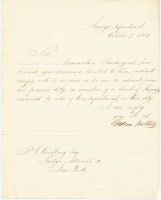 GIDEON WELLES (1802-1878)
|
| GIDEON WELLES (1802-1878) |
Secretary of the Navy during the Civil War
Civil War
Gideon Welles (1802-1878) served as Secretary of the Navy during the Civil War.
Born in Glastonbury, Connecticut, Welles studied law but went into journalism and in 1826, became the founder and editor of the Hartford Times. At the age of 25, he entered politics and was elected to the Connecticut legislature. Welles would serve as postmaster of Hartford and chief of the Bureau of Provisions and Clothing for the Navy.
Upon the outbreak of the Civil War, Welles was appointed Secretary of the Navy by President Abraham Lincoln. Welles implemented the Anaconda plan which gradually built up a fleet that was able to guard over 3,500 miles of Southern coastline and would isolate the South from the rest of the world.
During his retirement, Welles would write several books including Lincoln and Seward in 1874 and The Diary of Gideon Welles which was published after his death in 1911. In his diary, he writes a fascinating account of the major personalities he encountered during the Civil War.
This Department of Navy document, dated April 7, 1865 is signed by Welles in his capacity as Secretary of the Navy. The document officially detaches Lieutenant Commander John G. Walker from command of the U.S.S. Shawmut. The signature of "G Welles" is slightly rubbed but otherwise strong and legible. The document is also significant as it was issued two days prior to the official surrender by General Robert E. Lee at Appomattox Court House, Virginia on April 9, 1865. $250.00
|
|
 |
 Lieutenant GILS CURTISS (1753-1842)
|
| Lieutenant GILS CURTISS (1753-1842) |
Revolutionary War soldier, later Mayor of Berlin, Connecticut
1776 American Revolution
Revolutionary War soldier, later Mayor of Berlin, Connecticut. Served in the Major Eli Leavenworth's Company of the 6th Regiment of the Connecticut Line, among other units. Manuscript receipt for a delivery of shoes, shirts, socks and other much-needed clothing for the 4th Connecticut Regiment. Revolutionary-War-dated February 19, 1781. Boldly signed by Curtiss on the front. $225.00
|
|
 |
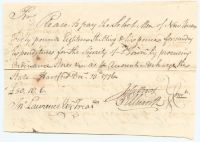 OLIVER ELLSWORTH (1745-1807)
|
| OLIVER ELLSWORTH (1745-1807) |
Continental Congressman and later US Senator for Connecticut, one of the framers of the US Constitution, Chief Justice of the US Supreme Court 1796-1800
1776 American Revolution
Continental Congressman and later US Senator for Connecticut, one of the framers of the US Constitution, Chief Justice of the US Supreme Court 1796-1800. He is credited with suggesting the name "United States" for his newly independent country. Lovely manuscript pay-table document authorizing funds for the "security" of Hartford, Connecticut. Dated December 13, 1776, just a few months after Independence. Boldly signed by Ellsworth on behalf of the pay-table committee. Also signed by famed early American jurist JESSE ROOT. $425.00
|
|
 |
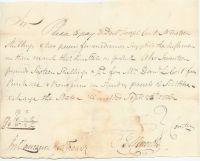 OLIVER ELLSWORTH (1745-1807)
|
| OLIVER ELLSWORTH (1745-1807) |
Superb Manuscript pay order to Dr, Joseph Cort for "medicines supplied the Riflemen marching through this Colony..."
1776 American Revolution
Continental Congressman and later US Senator for Connecticut, one of the framers of the US Constitution, Chief Justice of the US Supreme Court 1796-1800. He is credited with suggesting the name "United States" for his newly independent country. Superb Manuscript pay order to Dr, Joseph Cort for "medicines supplied the Riflemen marching through this Colony..." The riflemen in question were rifle companies raised by the Continental Congress and marching to join General George Washingtonxs hard-pressed Continental Army! An additional notation authorizes payment to Daniel Cort for "Saltpetre," a key component of gunpowder. Attractive and historic, dated September 24, 1776, and signed "O. Ellsworth." $450.00
|
|
 |
|

